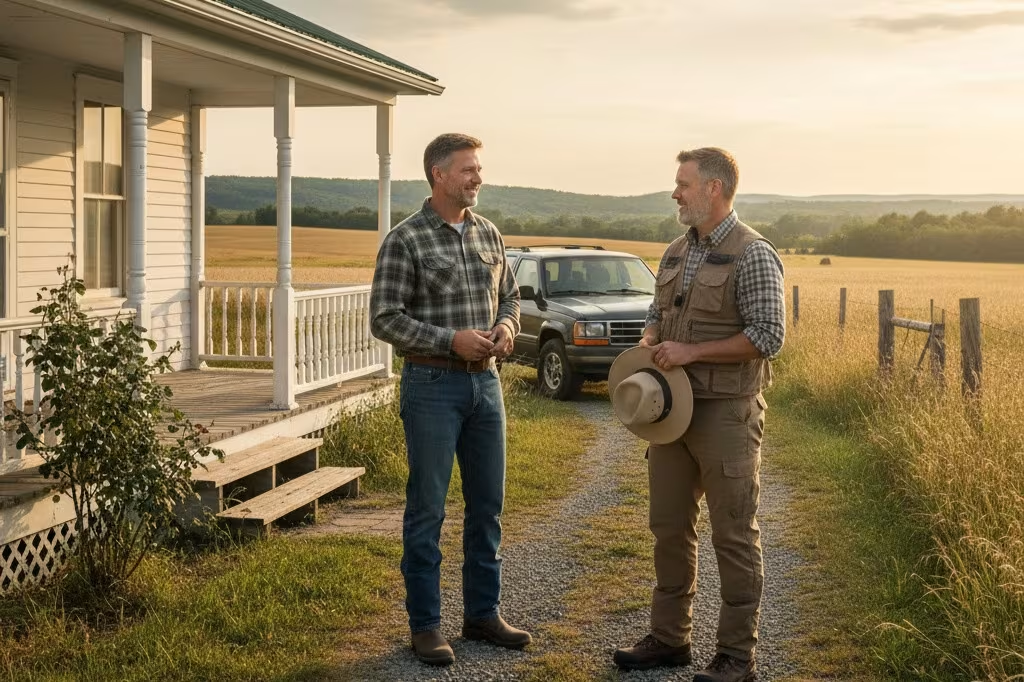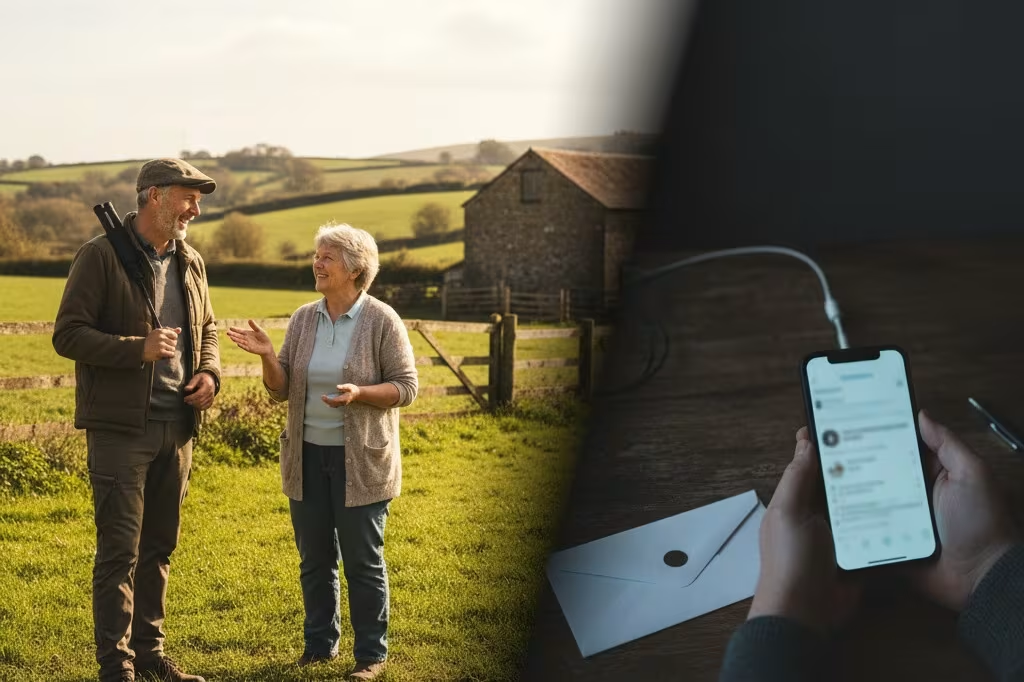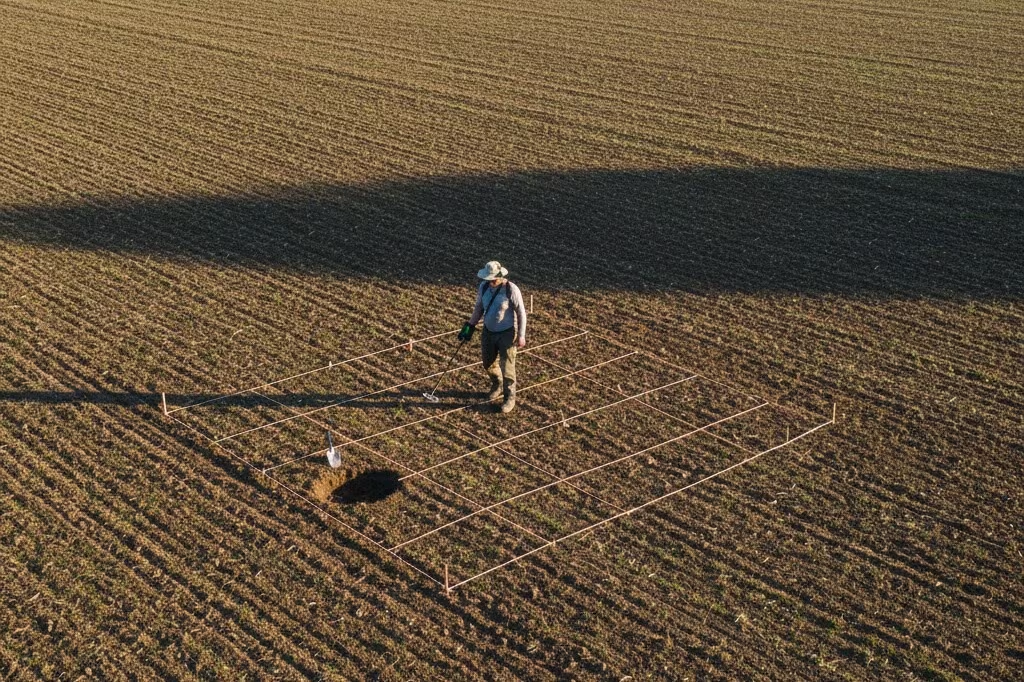- That Crushing "No" (And Why It's Actually Good News)
- Understanding Permission Denial: Why Landowners Say No to Metal Detecting
- How Permission Denial Works (And Why "No" Isn't Final)
- How to Ask for Permission After Being Denied: The Strategic Re-Engagement
- Strategies for Getting Landowner Permission: Offer Value First
- How to Negotiate Metal Detecting Site Access: Start Small
- Best Approach for Metal Detecting Permission Requests
- Professional Materials for Getting Permission on Private Property
- Turning No Into Yes: Long-Term Permission Strategies
- Key References
That Crushing “No” (And Why It’s Actually Good News)
Picture this scene from last spring.
I’d spent three hours digging through property records. Found an 1870s homestead with a documented Civil War encampment nearby. Drove forty minutes to get there. Practiced my pitch in the truck.
Then the landowner opened his door and said: “No.”
Most detectorists would’ve thanked him and left. Scratched that property off their list forever. Called it a loss.
But here’s the secret about metal detecting permission that changed everything for me: That “no” was actually 25-33% of the way to “yes.”[1]
Sounds crazy, right?
I get it. I didn’t believe it either after my first twenty rejections. I was ready to quit this hobby entirely. Then an old-timer at my local club told me something that shifted my whole approach to getting permission to metal detect on private property.
“Good salespeople never consider ‘no’ the end,” he said. “It may take 3-4 contacts before they grant permission. It’s just human nature.”[1]
That one insight transformed my approach to landowner permission.
Today? I hunt on over 40 private property detecting sites. About a third of them initially said no. The difference isn’t luck or charm. It’s understanding that metal detecting permission is a process, not a single event.
Let me show you how to turn rejection into your secret weapon.
Understanding Permission Denial: Why Landowners Say No to Metal Detecting

Before you can flip a “no” into a “yes,” you need to get inside their heads.
Here’s the truth: It’s almost never about you personally.
Timing Issues Kill More Permission Requests Than Anything
You know that farmer you approached during harvest season? He’s getting fifty requests a week. Hunters wanting access. Salespeople pitching equipment. Random people asking about everything under the sun.
His brain just defaults to “no” for everyone.
He literally can’t process another request. It’s not that he hates metal detecting. It’s that he’s mentally maxed out when you’re learning how to ask permission for metal detecting.[3]
They’re Scared of Getting Sued
Property owners worry about lawsuits if you get hurt. The Occupiers Liability Act makes them responsible for visitor safety. That’s real legal exposure.
Having insurance helps. But don’t lead with it. That makes you sound like you’re planning to get injured.
(Not exactly confidence-inspiring, right?)
Someone Already Burned Them
Maybe the last detectorist left giant holes everywhere. Or posted their finds on Facebook with recognizable landmarks. Or trampled their flower beds.
One bad apple really does spoil the bunch when approaching property owners for metal detecting.
You’re paying for someone else’s sins. Fair? Nope. Reality? Absolutely.
The Stranger Danger Reflex
Let’s be honest here.
You’re asking to wander around someone’s private property with a beeping machine and a shovel. If you can’t see why that might feel weird to a landowner who doesn’t know you, we need to work on your empathy muscles.
How Permission Denial Works (And Why “No” Isn’t Final)
Here’s what changed my entire approach to dealing with metal detecting permission denial:
“No” rarely means “never.”
It usually means “not right now.” Or “I need more information.” Or “I’m having a terrible day and can’t think about this.”
Understanding this simple truth transforms permission-seeking. It stops being a one-shot deal. It becomes relationship-building instead.
That’s the foundation for overcoming metal detecting permission rejection.
How to Ask for Permission After Being Denied: The Strategic Re-Engagement

Remember that 1870s homestead I mentioned?
I got permission there on my fourth contact. Took eleven months total. Here’s exactly how this second chance permission metal detecting strategy works.
What to Say When Property Owners Deny Permission
This is your make-or-break moment for the professional way to ask for detecting access.
Don’t argue. Don’t look disappointed. Don’t pressure them.
Instead, say this: “I completely understand. Thank you for considering it. Hey, I’d love to send you my quarterly newsletter. It has fun stories about local history finds. Times I’ve returned lost family heirlooms to their owners. Is this your mailing address?”[2]
Four things just happened in that one response:
- You showed respect for their decision
- You set up future contact
- You reframed the hobby positively
- You left them with something physical
That last part matters more than you’d think. People feel a tiny sense of obligation when you give them something.
Building Rapport with Property Owners: The Newsletter System
Here’s where most people fail at what to do when denied metal detecting permission.
They give up.
Don’t be most people.
The systematic approach uses a contact schedule that actually works for convincing landowners to allow metal detecting:
Month 1-3: Send a second newsletter. Zero permission requests. Just interesting finds stories. Heirloom returns that tug the heartstrings. This is one of the polite ways to reask for detecting permission without being pushy.
Month 3-6: Keep the newsletter coming. Add holiday cards. Send relevant local history articles about their specific area. You’re building rapport with property owners metal detecting while staying top-of-mind.
Month 6-12: Make your second ask. But with a fresh angle. “I’ve been detecting nearby properties. Found fascinating items from the 1880s. Thought you might want to know what stories your land could tell.”
Success Rates for Getting Landowner Permission
This approach converts roughly one in three initial rejections. The magic number? Most landowner permission requires 3-4 contacts before property owners say yes.[1]
You’re not being pushy. You’re being professionally persistent.
Real example from my own experience: I had one property take two years to convert. The farmer finally called me after his fourth newsletter. He’d just plowed up a bunch of old metal junk and wanted me to clear it.
Five years later, I’m still hunting that property twice a season.
That’s the power of these permission strategies.
Strategies for Getting Landowner Permission: Offer Value First
Here’s the biggest mistake beginners make with strategies for getting landowner permission.
They frame it as a favor: “Can I please, pretty please, detect your yard?”
That’s completely backwards.
Flip the script. Offer value first.
Creative Ways to Get Metal Detecting Permission
1. Become Their Property Historian
Try this: “May I help document your property’s history through metal detecting? I’ll share everything I find about past occupants and structures.”
This is brilliant for the best approach for metal detecting permission requests. Why? It appeals to curiosity.
My buddy Brian crushes it with this approach. He shows property owners historical maps on his phone during initial contact.[4] They love it. He prints copies of their homesite on old plat maps. Gives them away before asking for anything.
That’s smart positioning.
2. Lost Item Recovery Service
Reframe like this: “I’d love to metal detect for historical items. And while I’m at it, can I look for anything you’ve lost? Keys, jewelry, property markers?”
You’re offering a genuine service. Immediate value.
3. Farm Safety Cleanup

For farmers, this is pure gold when learning how to get on private land for metal detecting.
“I’ll remove all hazardous metal debris that could injure livestock or damage equipment.”
Sharp metal in fields is a real farm safety issue. I know one detectorist who clears about 50 pounds of rusty nails and wire from each property.
The farmers love him. He gets excellent site access.
Win-win.
4. Extra Eyes on the Property
You become the security patrol. Report broken fences. Spot trespassers. Notice injured livestock. Flag illegal dumping.
For large properties that are hard to patrol regularly, this actually adds value. Helps with property access metal detecting too.
5. Profit-Sharing (Use This Carefully)
The standard split is 50/50 on valuable finds over a threshold. Lower-value items belong to you.
But here’s what experienced hunters discovered: “It used to be 90 percent of property owners didn’t care to keep anything I found. Now more property owners want to keep finds.”[5]
Social media changed the game.
My advice? Offer to “show all finds and negotiate ownership of anything they want.” Don’t introduce rigid splits upfront. That creates objections that weren’t even there.
Customize Your Approach to Property Owners
Farmers care about practical benefits. Historic homeowners want research and stories. Suburban families want lost item recovery.
This is how you customize your approach when learning how to approach property owners for metal detecting.
How to Negotiate Metal Detecting Site Access: Start Small
When you get rejected, try this negotiation tip: Reduce the commitment until you find their “yes” threshold.
Time-Limited Permission Requests Work Better
“Could I detect just this Saturday afternoon?”
That’s way less scary than “Can I hunt your property forever?”
Many of my long-term detecting sites permissions started as one-afternoon trials. This is perfect for learning how to negotiate metal detecting site access.
Area-Restricted Property Access Reduces Risk

“Could I just search the back field near the old barn foundation?”
Much easier to accept than “all 80 acres, please.”
After you prove yourself on five acres, asking for more becomes simple. I have one property where I started with just the driveway area. Now I hunt the entire 40-acre farm.
These alternative ways to ask for detecting permission work because they reduce perceived risk.
Supervised Sessions Build Trust with Landowners
“Would you like to be present for the first session? So you can see exactly how I work?”
This is gold for nervous homeowners.
I’ve done this probably twenty times. Every single time, the landowner watches for 15 minutes. Gets bored. Goes inside. Tells me to come back whenever I want.
Using Social Proof to Get Permission
After you have one permission in a neighborhood, use it.
“I was just detecting Sam Smith’s place down the road. Sam will have to show you some of the stuff we found for him! Could I swing the detector over here for a while?”
That’s powerful social proof. One of the most effective tips for asking landowners metal detecting access.
The graduated strategy works. You build trust through actions, not promises.
Best Approach for Metal Detecting Permission Requests
In-Person vs Phone vs Letter: What Actually Works
The numbers are crystal clear for the best approach for metal detecting permission requests.
In-person approaches? 70-75% success on rural properties.[1]
Phone calls? Drop to 35-40%.
Letters? A dismal 5-15%.
Scott Clark says it bluntly: “IN PERSON IS ALWAYS BEST. Your chances go to half if you try to use the phone.”[1]
Research Property Owners Before Asking
Having the landowner’s name in advance doubles your success rate.
Tools like county tax records, OnX maps, or LandGlide app make this easy.
“Hi, are you Mr. Thompson?” versus “Hi, do you own this place?”
Completely different vibe.
Common Mistakes That Guarantee Permission Denial
Showing up with your detector: Rejection rates jump 60-80%. Leave ALL equipment in your vehicle. Walking up with a detector says “I’m doing this whether you like it or not.”
That’s not how to ask permission for metal detecting.
Using trigger words: Never say “dig,” “holes,” or “valuable.” Instead: “recover,” “small plugs,” “historical items.”[10]
Words matter in permission strategies.
Talking too much after asking: One of the pros emphasizes this: “STOP TALKING” after making your pitch.
Whoever speaks first loses.
Don’t talk yourself out of landowner permission by introducing objections they hadn’t even considered.
Bad timing: Never approach during planting season. Or harvest. Or mealtimes. Or early Sunday mornings.
Best timing? Early evening (6-7 PM). Winter months when farmers have downtime.
Professional Materials for Getting Permission on Private Property
Essential Tools for Asking Permission
Business cards: Ten bucks gets you 500 from VistaPrint. Put your name, phone, email on them. Add the Code of Ethics on the reverse.
Essential for the professional way to ask for detecting access.
Newsletter template: One page. Finds stories (not dollar values). Heirloom returns. Historical context. Send quarterly.
Critical for building rapport with property owners metal detecting.[2]
Show-and-tell box: 7-8 interesting historical items. Clay pipe stems. Buttons. Buckles. Wheat pennies.
I use a small plastic case. Perfect for demonstrating what’s possible at detecting sites.
Permission agreement: Written document. Party names. Contact info. Permitted areas. Duration. Finds ownership. Liability waiver. Code of Ethics.
This protects everyone. Provides clear site access parameters.
Property Research Before Approaching Landowners
Before approaching any property:
- Find the owner’s name
- Research property history (Library of Congress maps, historical societies)
- Locate multiple nearby properties
This prep work is essential for strategies for getting landowner permission.
Building a Referral Network for Detecting Sites

This is where magic happens for property access.
One experienced hunter maintains 75+ permissions. Get this: 90% come from referrals, not cold calling.[5]
Every permission should generate 1-3 referral opportunities.
After hunts, send thank-you cards. Include a small find. Ask: “Do you know other neighbors who might be interested?”
Some landowners will spontaneously call neighbors for you. That’s the power of building rapport with property owners.
Give talks at senior centers. Historical societies. Civic clubs. Join preservation organizations.
The goal? Transition from cold calling to warm referrals. Have property owners seek YOU out for site access.
Turning No Into Yes: Long-Term Permission Strategies
Here’s what changed everything for me with permission strategies.
I stopped seeing it as a transaction. Started seeing it as relationship-building instead.
That mindset shift made all the difference in getting permission to metal detect on private property.
What to Do When Denied Metal Detecting Permission
An initial “no” means “not right now.” Or “I need more information.” Not “never in a million years.”
That’s the foundation of what to do when denied metal detecting permission.
Use systematic follow-up. Offer creative value. Stay professionally persistent.
You can convert significant percentages of initial rejections. Get long-term landowner permission for prime detecting sites.
Action Steps for Getting Site Access
- Create professional materials (cards, newsletter) for the best approach
- Research 5-10 target properties with owner names and history
- Practice your pitch with value propositions and negotiation tips
- Prepare to pivot gracefully when dealing with permission denial
- Set calendar reminders (3-month, 6-month, 12-month follow-ups)
Use these polite ways to reask for detecting permission.
The Mindset for Successful Metal Detecting Permission
Every interaction with property owners reflects on our whole community.
Handle rejection with grace. Follow up professionally. Play the long game.
Some of my best detecting sites took years to develop. But they were worth every newsletter. Every patient re-ask.
The difference between average detectorists and pros who get property access? It’s not luck or charm.
It’s having systematic methods for turning no into yes metal detecting permission. Methods built on respect. Professionalism. Genuine relationships.
Now you know how to ask permission for metal detecting. Alternative ways to ask after rejection. Strategies for getting landowner permission. How to negotiate site access.
You have the negotiation tips. The professional approach. The rapport-building skills for overcoming rejection.
You’re ready to use these creative ways to get metal detecting permission.
Your future hunting grounds are waiting. Sometimes they just need patience to unlock.
Happy hunting, and may your “no’s” become your best “yes’s!” 🔍
Key References
- Scott Clark, “Getting Permission – Rural,” Detecting.us, https://www.detecting.us/2012/02/12/getting-permission-rural/
- Scott Clark, “Metal Detecting Permission: Perfecting the Pitch with Preparation,” Detecting.us, https://www.detecting.us/2012/01/26/metal-detecting-permission-perfecting-the-pitch-with-preparation/
- Joan Allen, “How to Ask Permission to Metal Detect,” JoanAllen.co.uk, https://www.joanallen.co.uk/ask-for-permission-metal-detect
- Brian Tobias, “How to Metal Detect Old Homesteads and Farm Fields,” Focus Speed, https://focusspeed.com/how-to-metal-detect-old-homesteads-farm-fields/
- Focus Speed, “Metal Detecting Permission Tips and Finds,” https://focusspeed.com/metal-detecting-permission-tips-finds/
- Strutt & Parker, “Key Considerations for Landowners Approached for Permission to Go Metal Detecting,” https://rural.struttandparker.com
- Metal Detecting Tips, “How to Get Permission to Metal Detect,” https://metaldetectingtips.com/how-to-get-permission-to-metal-detect/
- TreasureNet Forum, “Permission Discussion Threads,” https://www.treasurenet.com/
- Farmers Weekly, “Metal Detectorists on Your Land: What Farmers Need to Know,” https://www.fwi.co.uk/business/metal-detectorists-land-farmers-need-know
- Fossickr, “Permission to Metal Detect,” https://fossickr.com/permission-to-metal-detect/

My name is Paul and I am the founder of Detector For Metal, a dedicated resource for metal detecting enthusiasts seeking to uncover historical treasures and connect with the past using the latest technology. As a stay-at-home dad and family man, I’ve found metal detecting to be the perfect hobby that combines family adventure with historical learnings for the whole family.
As a father, I’m deeply committed to passing on this hobby to the next generation of detectorists, starting with my own children. I share advice on everything from metal detecting with kids to exploring the top 10 metal detecting sites you never thought about. My methodical approach to the hobby goes beyond the thrill of discovery—it’s about creating family traditions while preserving history and sharing the stories of those who came before us.


